
![]()
Introduction
Breslau in pictures
This page is also available in French
![]()
In Berlioz’s time Breslau, at the eastern end of the German-speaking world, was part of Prussia. After World War II the city was assigned to Poland and is now known as Wroclaw. Unsurprisingly given its location it was not initially on Berlioz’s projected itinerary for his first trip to Germany (Correspondance Générale no. 791; hereafter CG for short). It was apparently thanks to the suggestion of Ferdinand Friendland, a music-lover and friend of Berlioz who was resident in Breslau at the time, that Berlioz formed the project of going there to conduct his music.
Ferdinand Friedland is himself a little-known and rather elusive figure. The surviving correspondence between him and Berlioz is limited to half a dozen letters between December 1842 and February 1856 which leave many unanswered questions (cf. also Nouvelles lettres de Berlioz [NL], p. 207). It is not known when the two men first met – presumably in Paris, and some time before Berlioz set off for Germany. At any rate they were in contact at the end of 1842, and it is likely that they had just met again in Frankfurt, where Friedland happened to be at the time. In a letter from Stuttgart dated 30 December (CG no. 794) Berlioz tells Friedland of his recent concert in Stuttgart, his forthcoming visit to Hechingen, and his plans after that. Should a projected visit to Munich not materialise, he writes, then
[…] I think I will decide, at least according to your advice, to go directly to Breslau. If you write to me that everything is ready and guaranteed and that I can count on a profit of at least one thousand francs for the first concert, then I will not hesitate. You will understand that I must first go to places where I have friends such as yourself who can pave the way and look after my interests before I appear in a city like Vienna where I do not know anybody and where expenses must be considerable. So as soon as you arrive in Breslau, be kind enough to see whether I can be assured of two concerts in which my three symphonies would be performed. […]
For whatever reason, the hopes for a concert in Breslau in 1843 did not materialise. At the end of March Berlioz was still keeping the possibility open (CG no. 823ter [in vol. VIII]). The following month, on 9 April, Berlioz wrote from Berlin to Friedland (CG no. 827): he was worried that a previous letter had remained unanswered, and asked Friedland to let him know whether the conditions he had stated for appearing in Breslau were acceptable. No satisfactory answer was apparently received, and according to the Memoirs (beginning of the 10th and final letter on his first German trip) the projected visit to Breslau was postponed to another trip, as were visits to Munich and Vienna.
In the meantime Friedland went to settle in Prague, where he was the proprietor of the city’s gas factory, a position he continued to hold for years to come. In a letter to Berlioz dated 3 February 1856 (CG no. 2092) he signs his letter rather emphatically ‘Ferdinand FRIEDLAND, Proprietor of the Gas Factory of the city of Prague’. It was apparently during Berlioz’s first stay in Prague in January 1846 that the two men met again and that the idea of a visit to Breslau was revived. On 27 January Berlioz in Prague mentions casually to his friend Joseph d’Ortigue that ‘three concerts are being organised for me in Breslau’ (CG no. 1017; cf. also nos. 1019, 1022). In a letter dated 19 February Friedland, on his way via Brussels to Paris, sends Berlioz a detailed list of useful contacts in Breslau who could help in organising concerts (CG no. 1024; none of the named individuals is mentioned by Berlioz in his extant letters or in the Memoirs). Berlioz travelled from Vienna to Breslau by stagecoach and arrived early in March; he stayed there some three weeks in all until the 24th.
The stay in Breslau is dealt with in chapter 54 of the Memoirs as an afterthought to the six letters which are main account of the second trip to Germany:
In the previous letters addressed to M. H. Ferrand I said nothing of my trip to Breslau. I do not know the reason for this omission, as my stay in the capital city of Silesia was both beneficial and agreeable. Thanks to the warm support I received from several people, among them M. Kœttlitz, a young musician of great talent, Dr Naumann, an eminent doctor and a knowledgeable music-lover, and the famous organist Hesse, I was able to give a concert in the Hall of the University (Aula Leopoldina) with excellent results from every point of view. Listeners had come from the surrounding countryside and towns; the takings greatly exceeded what I normally made in German cities, and the public gave the most splendid welcome to my compositions. I was all the more delighted as the day after my arrival I attended a musical event during which the audience remained cold throughout. The performance of even a most wonderful work such as Beethoven’s Symphony in C Minor was followed with complete silence. I was taken aback at this coolness, unparalleled in my experience anywhere else, and when I protested at such a reception being given to Beethoven, a lady who was in her own way a devoted admirer of the great master said: « You are mistaken, the public admires this masterpiece as much as it is possible, and if they do not applaud it is out of respect! » In Paris and wherever the shameful operations of the claque are standard practice such a statement would be charged with meaning, but I admit it caused me great alarm. Fortunately nothing of the sort happened and on the day of the concert the audience, to whose respect I probably did not have sufficient claims, thought I deserved to receive the same vulgar treatment that is adopted in the whole of Europe for artists who are appreciated by the public, and I was applauded in the most irreverent manner.
As can be seen Berlioz only gave one concert (on 20 March), instead of the projected three, in the Aula Leopoldina at the University of Breslau. Neither here nor in his correspondence does he mention the programme. It included the second movement from Harold in Italy, the first three movements of the Fantastic Symphony, the recently composed bolero Zaïde, the overture Roman Carnival which had been such a success in Vienna, and also the Caprice for piano and orchestra by Mendelssohn. In the Memoirs (chapter 55) Berlioz also relates how two days before the concert he was asked to give violin lessons to his son by a music-lover who mistook him for the celebrated violinist Charles de Bériot…
But Berlioz’s dominant preoccupation in Breslau was not the concert itself but the composition of the Damnation of Faust which he had been contemplating since before his departure from Paris for Vienna. According to the Memoirs (chapter 54) it was during the journey by stagecoach from Vienna to Breslau that Berlioz wrote the verses for the Invocation to Nature (in Part IV), and in Breslau he wrote the words and music of the student song Jam nox stellata velamina pandit (in Part II). Several letters dating from his stay or shortly after gave glimpses of his changing moods during this period. To Dr Ambros in Prague (CG no. 1026, 10 March):
[…] After the only concert that I will be giving here on the 15th or the 16th I will depart for Prague where I will feel much more at home than in this cold and rather unmusical Silesian city. […]
The same day to Joseph d’Ortigue (CG no. 1028):
[…] I am giving myself a great deal to do with my great opera on Faust (a concert opera in 4 acts) on which I am working furiously and which will soon be finished. It has choral pieces that will require careful study and need to be polished. I have great hopes for this composition, which is preoccupying me to the point that I am almost forgetting the concert I am preparing here (or rather which is being prepared for me). I was not much taken by the example the Breslau musicians gave of their ability, though they are assiduous and are fêting me as best they can. This morning there is even a poster which says: Grand concert by M. Schöne the Kapellmeister in honour of Sir Hector Berlioz from Paris. So tomorrow I will be obliged to show myself in a balcony decked with flowers and decorations and I will be fetched in a carriage. Given the war with Poland no cannon shots will be fired, but smoking in the hall is forbidden. […]
On 13 March he heard a performance of Mendelssohn’s Midsummer Night’s Dream and back in Prague wrote to him expressing regret he would not have time to see him in Leipzig (CG no. 1033, 14 April):
[…] It is a real disappointment for me. Allow me to say that in Breslau I heard your Midsummer Night’s Dream and that I have never heard anything so deeply Shakespearean as your music. When I came out of the theatre I would willingly have sacrificed three years of my life to be able to embrace you. […]
On his last day in Breslau (24 March) he started a letter to his sister Nancy which he finished the following day in Prague (CG no. 1029):
[…] I reached this point in my letter (in Breslau) when my visitors came to make their farewell and escorted me all the way to the railway station and the train. On arriving here today (in Prague) I am picking up my letter where I left it. The (only) concert in Breslau was magnificent and the entire Silesian nobility of the city was present, but the preparations were so long and tedious that in the end I did not want to have anything further to do with them. I started to work on my new score, leaving the preparations to two amateur musicians who were eager to get me to give a concert in Breslau. In the end everything went as desired and in spite of the forecasts of some old musicians who maintained that I would not cover my expenses because of the well-known Indifference to music of the inhabitants of Breslau, I had the largest takings of any concert I have done in Germany and unending success. […]
I have also worked hard at a concert opera in four acts for which I had to write nearly half of the words (the libretto was not finished when I left Paris); it is called The Damnation of Faust. Three quarters of the music are written, but it will take me another five or six months to finish the work because of the difficulty I expect to find in doing the last act well. I will try to put this on at the Italian Theatre in Paris next winter. […]
Berlioz did not subsequently return to Breslau, but after his visit he remained in touch with Ferdinand Friedland. Friedland was among the friends of Berlioz who came to his help financially after the failure of the Damnation of Faust in Paris in December 1846. Berlioz mentions this in his Memoirs (the only reference to Friedland in this work), though curiously he implies that it was during the stay in Prague in January 1846 that they first became acquainted with each other. In 1848 when he eventually published his 3 letters about this visit to Prague in 1846 he dedicated them to Friedland, though the dedication was removed from the version included later in the Memoirs. The last preserved letter of Berlioz to Friedland, dated 14 April 1854 and written while the composer was in Dresden (CG no. 1735bis [in vol. VIII]), refers again to the episode of the Damnation of Faust:
[…] I have often asked our friends in Paris where you were, what you were doing, etc. and nobody has been able to give me any news of you. I had a vague recollection of hearing that you were no longer in Europe. It is bad of you to leave me so completely without a line from your pen, after the service which you so graciously did me at the time of my departure for Russia. You were very courteous and good on that occasion, and I will never forget it. […]
Friedland had not in fact forgotten Berlioz. In his last known letter to Berlioz, dated 3 February 1856, he writes to him from Prague (CG no. 2092). He has heard that Liszt is to conduct Benvenuto Cellini in Weimar and asks Berlioz to send him the score of the overture for possible inclusion in a forthcoming concert: it was the only orchestral work of Berlioz that had not yet been played in Prague. Berlioz’s response to this is not known.
Interest in Berlioz and his music remained alive in Breslau in subsequent years. When in April 1863 Berlioz visited Löwenberg in Silesia not far away, he was told of a recent performance of the Queen Mab scherzo (from Romeo and Juliet) in Breslau (CG no. 2714). During his visit to Vienna in December 1866 to perform the Damnation of Faust, he received an invitation from Breslau to conduct Romeo and Juliet – but by now Berlioz was too exhausted to be able to accept (CG nos. 3191, 3200). It is not known whether Friedland was involved in the invitation.
![]()
All the pictures displayed below have been scanned from postcards and engravings in our collection. All rights of reproduction reserved.
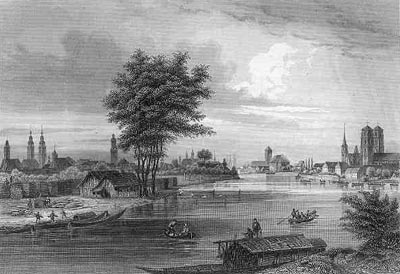
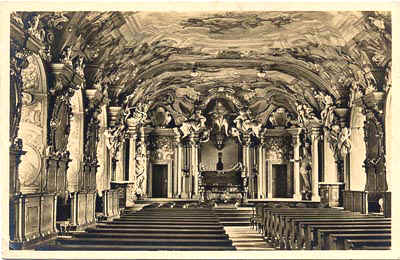
(Large view).![]()
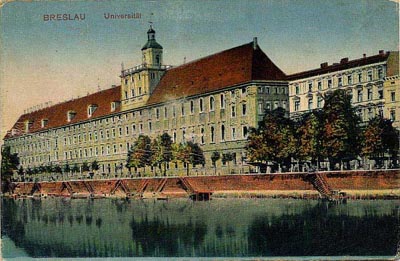
We have not been able to establish the date of this postcard.![]()
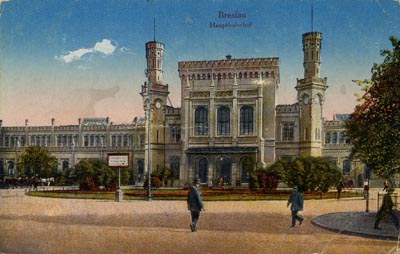
The first stretch of a railway line in Breslau was opened in 1842 which linked the city to Olawa. By the time Berlioz visited Breslau it had also been linked to Prague, among others.
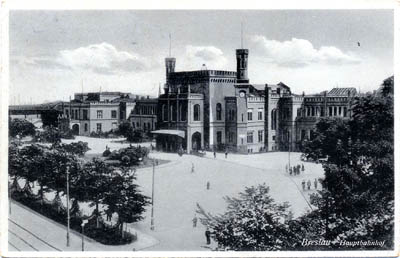
![]()
The Berlioz in Breslau page was created on 1 November 2006. Revised on 1 February 2024.
© Michel Austin and Monir Tayeb. All rights reserved.